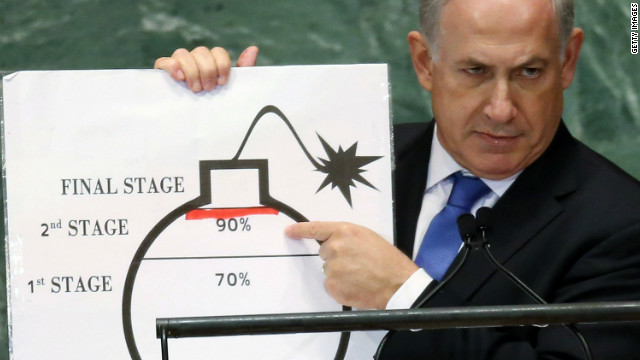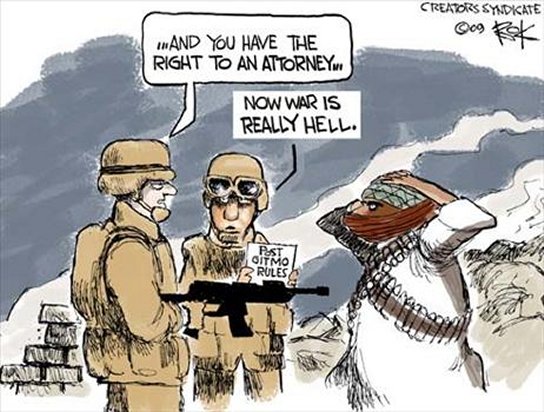 |
| Prime Minister Netanyahu of Israel at the UN General Assembly, 2012 |
During the recent United Nations General Assembly, the prime minister of Israel gave a memorable performance. Prime Minister Netanyahu repeated his usual warnings about Iran, this time with the help of poster with a cartoon bomb. Claiming that Iran will soon create a nuclear weapons program, he calls on the United States to commit to a "red line", a point beyond which there would be a military intervention. In other words, Netanyahu wants America to threaten Iran with war for the sake of nuclear nonproliferation, even though Iran is not actively developing nuclear weapons. Iran does not claim to have a nuclear weapons program, and US intelligence has found no evidence of such a program. However, Iran is developing its nuclear energy capabilities. Some argue that the abundance of oil and gas in Iran makes it implausible that the government would invest in nuclear energy unless they intend to later develop nuclear weapons. However real the threat of Iran developing nuclear weapons is, the rhetoric used by Netanyahu and American politicians is a facade for what is part of a larger geopolitical struggle.
The hostile attitudes towards Iran among the United States and other western nations date back to the Iranian Revolution in 1979. Demonstrations against the Iranian monarchy headed by the Shah, who supported policies of westernization, rapidly grew into civil resistance and eventually armed conflict. Once the old regime collapsed, a new theocratic government called the Islamic Republic of Iran was established. Ayatollah Ruhollah Khomeini was proclaimed the Supreme Leader of Iran. Khomeini tried to distinguish the ideology of the Iranian Revolution from the dominant ideologies of capitalism and communism with the slogan: "Neither East, nor West – Islamic Republic!". From the beginning, the new Iranian state was at odds with the West due to its theocratic government and rejection of liberal capitalism. Relations became even more hostile during the Iranian hostage crisis, which was likely the result of US support for the Shah. It was clear that the Islamic Republic would use any means available to assert its sovereignty and oppose Western expansion into the Middle East.
 |
| Iranian election protests, 2009 |
"The future of Iran belongs to the young people – the youth who will determine their own destiny... You are not bound by the chains of the past – the distracting hatred of America that will create no jobs or opportunity; the rigid and unaccountable government; the refusal to let the Iranian people realize their full potential for fear of undermining the authority of the state. Instead, you – the young people of Iran – carry within you both the ancient greatness of Persian civilization, and the power to forge a country that is responsive to your aspirations. And though times may seem dark. I want you to know that I am with you."
 |
| Graph of Iranian currency exchange rate vs US dollar, 2010-2012 |
It seems that Obama was trying to encourage the protesters to overthrow the Islamic Republic and establish a more West-friendly government. When stated with such grandiose rhetoric, this seems like a noble goal. But since then, Obama has used reprehensible tactics to achieve this end: harsh sanctions against the mass of the Iranian population. Sanctions against Iran were initiated during the Bush era, in 2006, but Obama has intensified the sanctions to a much higher degree. Though the Obama administration describes them as "smart sanctions", affecting only the import of military goods by the government, the vast majority of Iranian civilians have nonetheless been affected. Recently, the effects of the sanctions have developed into a full-blown crisis, with the Iranian currency losing 80% of its value in one year sparking renewed protests. If their currency collapses, all bets are off for the future of Iran. While some believe the sanctions to be a means of weakening Iran for a US-led invasion, they are more likely aimed at triggering an Egypt-style revolution. From the perspective of Western interests, the best case scenario is one that opens up Iran's oil and gas exports to the West while leaving in place part of the old power structure to maintain regional stability. It remains to be seen whether the fate of Iran will benefit the United States and its allies, but what is certain is that the suffering of the Iranian people is far from over.












